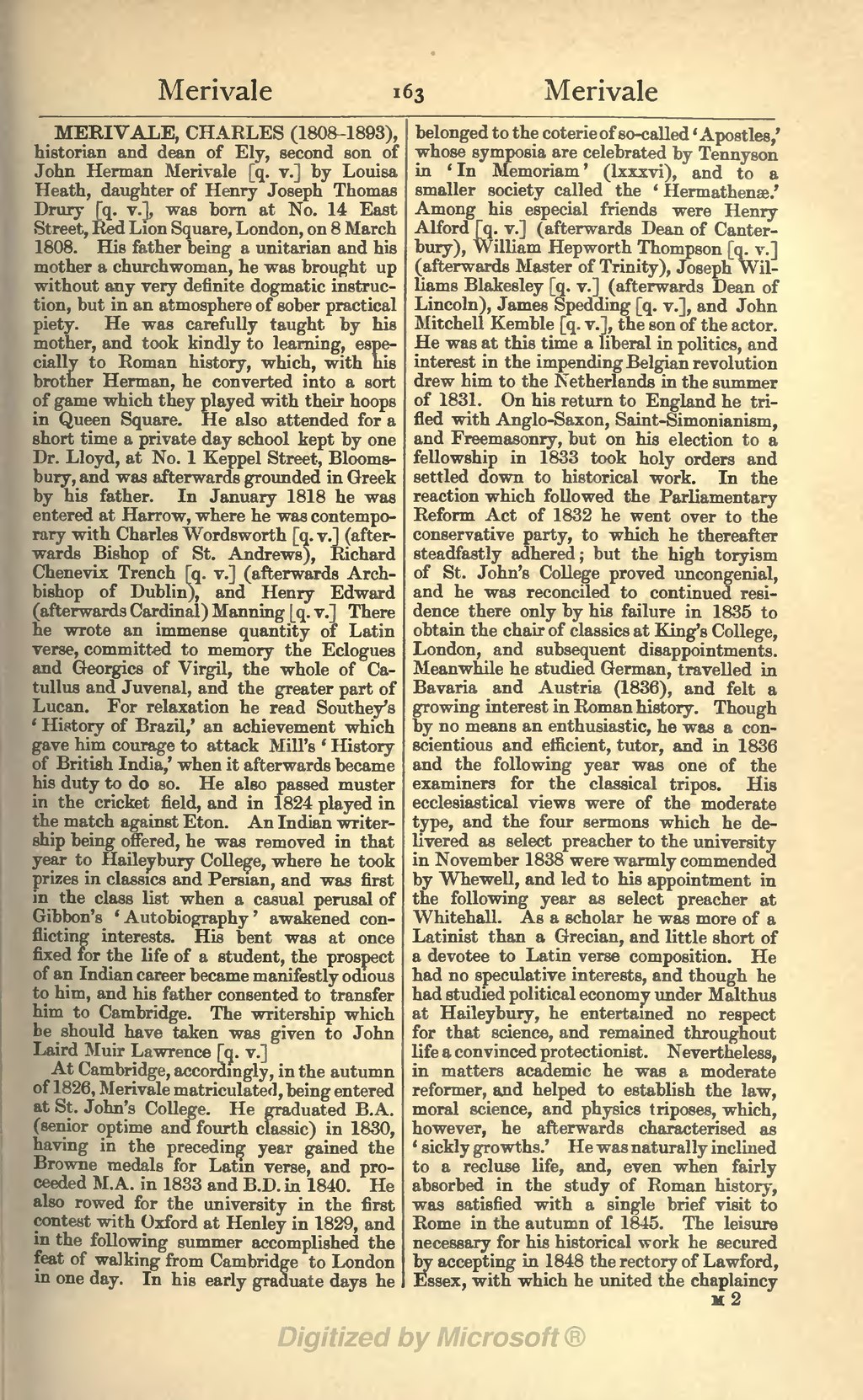MERIVALE, CHARLES (1808–1893), historian and dean of Ely, second son of John Herman Merivale [q. v.] by Louisa Heath, daughter of Henry Joseph Thomas Drury [q. v.], was born at No. 14 East Street, Red Lion Square, London, on 8 March 1808. His father being a Unitarian and his mother a churchwoman, he was brought up without any very definite dogmatic instruction, but in an atmosphere of sober practical piety. He was carefully taught by his mother, and took kindly to learning, especially to Roman history, which, with his brother Herman, he converted into a sort of game which they played with their hoops in Queen Square. He also attended for a short time a private day school kept by one Dr. Lloyd, at No. 1 Keppel Street, Bloomsbury, and was afterwards grounded in Greek by his father. In January 1818 he was entered at Harrow, where he was contemporary with Charles Wordsworth [q. v.] (afterwards Bishop of St. Andrews), Richard Chenevix Trench [q. v.] (afterwards Archbishop of Dublin), and Henry Edward (afterwards Cardinal) Manning [q. v.] There he wrote an immense quantity of Latin verse, committed to memory the Eclogues and Georgics of Virgil, the whole of Catullus and Juvenal, and the greater part of Lucan. For relaxation he read Southey's 'History of Brazil,' an achievement which gave him courage to attack Mill's 'History of British India,' when it afterwards became his duty to do so. He also passed muster in the cricket field, and in 1824 played in the match against Eton. An Indian writership being offered, he was removed in that year to Haileybury College, where he took prixes in classics and Persian, and was first in the class list when a casual perusal of Gibbon's 'Autobiography' awakened conflicting interests. His bent was at once fixed for the life of a student, the prospect of an Indian career became manifestly odious to him, and his father consented to transfer him to Cambridge. The writership which be should have taken was given to John Laird Muir Lawrence [q. v.]
At Cambridge, accordingly, in the autumn of 1826, Merivale matriculated, being entered at St. John's College. He graduated B.A. (senior optime and fourth classic) in 1830, having in the preceding year gained the Browne medals for Latin verse, and proceeded M.A. in 1833 and B.D. in 1840. He also rowed for the university in the first contest with Oxford at Henley in 1829, and in the following summer accomplished the feat of walking from Cambridge to London in one day. In his early graduate days he belonged to the coterie of so-called 'Apostles,' whose symposia are celebrated by Tennyson in 'In Memoriam' (lxxxvi), and to a smaller society called the 'Hermathenæ.' Among his especial friends were Henry Alford [q. v.] (afterwards Dean of Canterbury), William Hepworth Thompson [q. v.] (afterwards Master of Trinity), Joseph Williams Blakesley [q. v.] (afterwards Dean of Lincoln), James Spedding [q. v.], and John Mitchell Kemble [q. v.], the son of the actor. He was at this time a liberal in politics, and interest in the impending Belgian revolution drew him to the Netherlands in the summer of 1831. On his return to England he trifled with Anglo-Saxon, Saint-Simonianism, and Freemasonry, but on his election to a fellowship in 1833 took holy orders and settled down to historical work. In the reaction which followed the Parliamentary Reform Act of 1832 he went over to the conservative party, to which he thereafter steadfastly adhered ; but the high toryism of St. John's College proved uncongenial, and he was reconciled to continued residence there only by his failure in 1835 to obtain the chair of classics at King's College, London, and subsequent disappointments. Meanwhile he studied German, travelled in Bavaria and Austria (1836), and felt a growing interest in Roman history. Though by no means an enthusiastic, he was a conscientious and efficient, tutor, and in 1836 and the following year was one of the examiners for the classical tripos. His ecclesiastical views were of the moderate type, and the four sermons which he delivered as select preacher to the university in November 1838 were warmly commended by Whewell, and led to his appointment in the following year as select preacher at Whitehall. As a scholar he was more of a Latinist than a Grecian, and little short of a devotee to Latin verse composition. He had no speculative interests, and though he had studied political economy under Malthus at Haileybury, he entertained no respect for that science, and remained throughout life a convinced protectionist. Nevertheless, in matters academic he was a moderate reformer, and helped to establish the law, moral science, and physics triposes, which, however, he afterwards characterised as 'sickly growths.' He was naturally inclined to a recluse life, and, even when fairly absorbed in the study of Roman history, was satisfied with a single brief visit to Rome in the autumn of 1845. The leisure necessary for his historical work he secured by accepting in 1848 the rectory of Lawford, Essex, with which he united the chaplaincy
